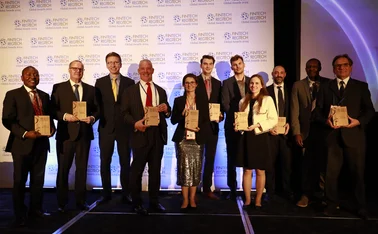
Lifetime achievement: Zhou Xiaochuan
Former PBoC governor stands out for his high levels of integrity, intellectual rigour and bold reforms
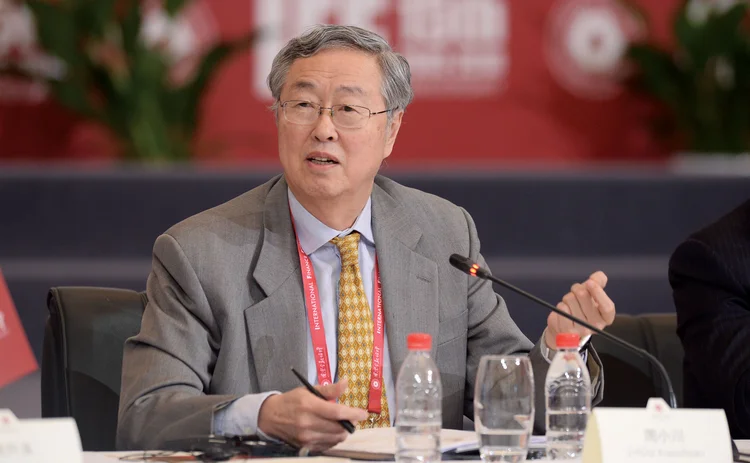
Zhou Xiaochuan stepped down as governor of the People’s Bank of China in March 2018 after a record 15 years. The impact he has had on the central bank, the Chinese economy and beyond is remarkable. While in office, Zhou demonstrated high levels of integrity in his pursuit of public service. He brought academic rigour to real-world decision-making, acting as a pragmatic policy-maker with a strong sense of what was in the public interest. His leadership is reflected in the significantly upgraded institutional capacity and credibility of the PBoC, which Zhou helped turn into an apex macroeconomic problem-solver for China.
Zhou has also made an indelible imprint as a bold reformer. He played a pivotal role in exchange rate and interest rate liberalisation, financial services and capital market reform, and capital account convertibility and renminbi internationalisation – all enacted on the basis of robust theoretical foundations. Notably, the major reforms Zhou helped to drive have taken place over a sustained period of time, including under the presidencies/premierships of Jiang Zemin/Zhu Rongji, Hu Jintao/Wen Jiabao and Xi Jinping/Li Keqiang, with China achieving elevated and sustained growth throughout.
“Zhou has a great reputation amongst his colleagues and superiors for being very open-minded, clear in his analysis and a great attractor of talent, open to bringing home many US and foreign-trained economists and bankers,” says Andrew Sheng, an international adviser to China Investment Corporation (CIC) and the China Development Bank, and former deputy chief executive of the Hong Kong Monetary Authority (HKMA). “The willingness to debate and engage created the reputation and authority that served him and the PBoC well.”
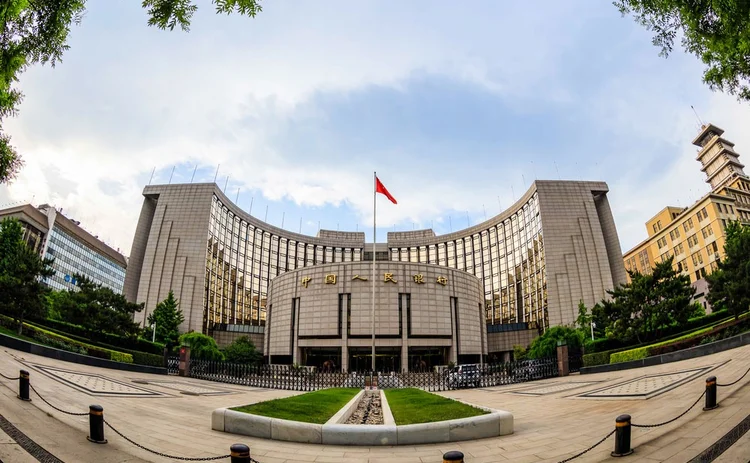
Critically, Zhou also kept a firm lid on inflation during his 15 years in office, despite not having full control in setting interest rates (the official responsibility lies with the State Council). He did this by taking a strategic view about institutions and their role in helping to strengthen China’s ability to implement monetary policy.
“During his tenure, he has successfully steered monetary policy while structural transformation was in full swing, contributing importantly to China’s sustained growth to become the second-largest economy in the world,” Christine Lagarde, managing director of the International Monetary Fund, tells Central Banking.
Early career
Zhou was named governor of the PBoC in December 2002 by then-premier Zhu, himself one of China’s most influential reformers. By then, Zhou’s career had already flourished. The son of Zhou Jiannan – a former senior Communist party and government vice-minister, who is said to have acted as a mentor to future president Jiang – the younger Zhou graduated from the Beijing Institute of Chemical Technology in 1975, and received his PhD in automation and systems engineering at Tsinghua University in 1985. From 1986 to 1991, he was a member of the State Commission for Restructuring the Economic System. During this period, he was also a member of the State Council Leading Group on Program of Restructuring the Economic System and a deputy director of the Research Institute of Economic Structural Reform from 1986 to 1987. From 1987 to 1988, he was a visiting scholar at the University of California, Santa Cruz, while also from 1986 to 1989, he was assistant minister in the Ministry of Foreign Trade and Economic Co-operation (now the Ministry of Commerce).
Zhou has a great reputation amongst his colleagues and superiors for being very open-minded, clear in his analysis and a great attractor of talent, open to bringing home many US and foreign-trained economists and bankers
Andrew Sheng, adviser to CIC and CDB
From 1991 to 2002, Zhou served in a number of positions, including vice-president of the Bank of China (1991–95), administrator of the State Administration of Foreign Exchange (Safe) between 1995 and 1998, deputy governor of the PBoC (1996–98), president of the China Construction Bank (1998–2000) and chairman of the China Securities Regulatory Commission (2000–02), where he sought to root out corruption, before taking over as governor of the PBoC in 2002.
“Even though his stint at the CSRC was short, he made critical decisions in the opening up of the capital (stock and bond) markets,” says Sheng, who was also a former head of the Hong Kong Securities and Futures Commission in addition to his above-mentioned roles.
Asian financial crisis
An early example of Zhou’s growing influence took place while he was still administrator of Safe and deputy governor of the PBoC in 1998. At this time, the Asian financial crisis – triggered by a significant reversal of speculative fund flows out of Asian nations, exposing their excessive levels of US dollar indebtedness – had resulted in the contagious collapse of exchange rates in countries such as Thailand, Indonesia, the Philippines and South Korea. Malaysia was forced to impose capital controls, while Hong Kong, which had just returned to Chinese rule in 1997, fought hard to maintain its currency peg to the US dollar – an effort that included the HKMA taking the unorthodox action of using its foreign exchange (forex) reserves to buy Hong Kong equities.
Zhou was one of the central parties involved in a fierce debate within China about whether or not to devalue the renminbi. Earlier reforms to China’s exchange rate policy in 1994 effectively resulted in an effort to keep the exchange rate undervalued versus the greenback to boost export-led economic growth. But this regime created external pressures for an exchange rate revaluation as well as a headache for PBoC monetary policy, especially if China wanted to have a more open capital account. It also resulted in a build-up of ever-larger forex reserves as China ran surpluses in both its current and capital accounts, which required ever-greater levels of sterilisation.
Zhou played an important role in supporting the effort by Zhu (who became Chinese premier in March 1998) not to devalue renminbi in a bid to maintain China’s competitiveness and macroeconomic stability. Zhou and former PBoC governor Dai Xianglong made the economic case that China should maintain its peg to reinforce confidence, support the country’s bid to join the World Trade Organization (WTO), and help prevent a devaluation of the Hong Kong dollar. In February 1998, Zhou is reported to have reassured Safe regional bureau chiefs that the renminbi would not be devalued, with the formal announcement coming from premier Zhu the following month.1
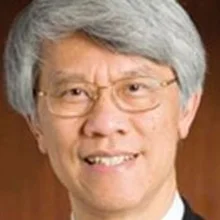
The decision not to depreciate the Chinese currency is viewed as a decisive factor preventing further crisis contagion in the region, enhancing China’s reputation among its peers, while also raising the PBoC’s standing both domestically and at the international level.
“The decision not to devalue the renminbi in 1998 was a pivotal factor in stabilising the Asian financial crisis,” Joseph Yam, then-chief executive of the HKMA, tells Central Banking. “I believe that stability of the renminbi exchange rate then contributed significantly to making the task of the HKMA in defending the Hong Kong dollar’s fixed exchange rate against the US dollar more manageable than would otherwise have been the case.”
Monetary policy challenges
After the Asian financial crisis, China’s growth slowed between 1998 and 2002 with a prolonged deflation, prompting some among the Chinese leadership to seek to pump up the country’s economy via credit expansion. Not long after taking over the PBoC governorship, Zhou was alarmed by credit expansion, especially in the real-estate sector, which exhibited emerging signs of asset price inflation. The PBoC, under Zhou, took unilateral actions against credit expansion in the face of opposition from powerful bureaucratic players, and eventually won support from then-premier Wen Jiabao, who gave the green light for a hike in interest rates in 2004. This move by Zhou largely cemented the central bank’s authority and credibility in monetary policy, and also marked an institutional rise of the PBoC in Beijing’s broader macroeconomic management.

“Zhou helped set up a monetary policy framework from scratch, and equipped the bank with an array of modern policy instruments as well as administrative measures that worked well with China’s hierarchical system,” says Hui Feng, Central Banking contributory editor and co-author with Stephen Bell of The rise of the People’s Bank of China: the politics of institutional change.1
While the PBoC gained greater credibility in setting monetary policy during this period, it also highlighted a recurrent challenge for Zhou and his team: the difficultly and delicate nature of controlling consumer price index and asset price inflation, given China’s artificially low exchange rate and the imperative to maintain high levels of growth.
The artificially low exchange rate (something Zhou has consistently tried to address) resulted in the PBoC having to buy foreign reserves by paying for them in renminbi and then trying to sterilise its actions through raising reserve requirements and issuing PBoC bills that are bought by banks. And since 2006, the PBoC set up a targeted issue scheme where specific banks have to underwrite PBoC bills at a yield lower than the prevailing market at the discretion of the PBoC. This allows the PBoC to adjust overall liquidity management of the market as well as the liquidity positions of the banks. Large savings rates have helped to keep sterilisation costs under control. But the PBoC incurs a net loss (which can be written off by the government) estimated by some to be in excess of $30 billion a year. Meanwhile, reserve requirements hit 16.5% and PBoC bills reached 10% of bank deposits by June 2011, resulting in structural costs to the economy.
The need to maintain growth well above 6% also means China’s leaders are prone to loosening the reins on credit when faced with a potential downturn. A good example is the 4 trillion yuan ($593.4 billion) fiscal stimulus unleashed in 2008 to counter the effects of the global financial crisis. This credit expansion contributed to asset prices exploding in some sectors, and undermined some of the efforts by banks to improve risk management, with many high-risk/-return projects being financed in the knowledge this could cause non-performing loan (NPL) problems in the years ahead.
These dynamics have resulted in off, on, off, and on again reform momentum.
Historic de-pegging in 2005
Renminbi had remained fixed at 8.2 to the US dollar since the Asian financial crisis until 2005.
But in the years after China acceded to the WTO in 2001, the country’s exchange rate policy faced increasing criticism from global peers for the renminbi being undervalued. Within China, however, there were fears that any appreciation of the currency would lower import prices and increase real interest rates. This had the potential to hit many vested parties – not just exporters, but also the country’s important agricultural sector, demand for whose products could be hurt by cheaper imports.
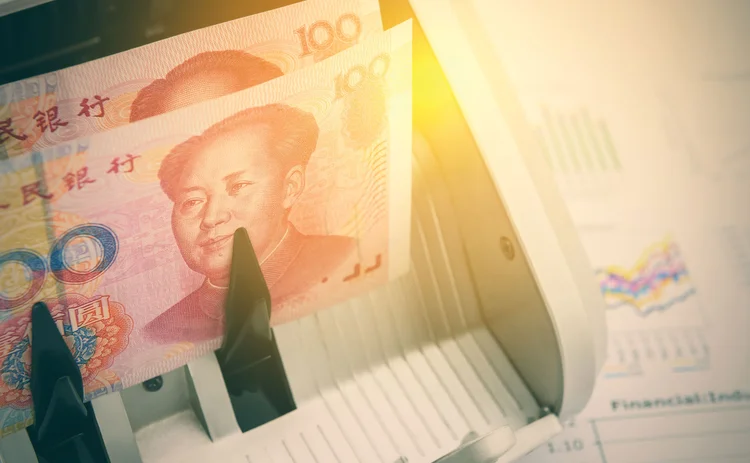
China’s Ministry of Finance, in particular, was worried that a currency appreciation would damage the ability of regional governments to repay their loans. And it was not alone. “Ministries except the PBoC have been lukewarm at best, if not negative, on the issue of renminbi de-pegging and revaluation,” say Bell and Hui in their book. “However, it had been the utmost concern of the PBoC to liberalise the exchange rate regime primarily to gain greater monetary policy discretion. In this contest, the PBoC was a critical player behind Beijing’s move to in 2005 to discontinue the renminbi dollar peg.”
To maintain China’s exchange rate, the central bank had to buy excess forex in the interbank market with renminbi – the equivalent to issuing base money. The PBoC then credited the reserve accounts of commercial banks with an equivalent amount of renminbi. That ratio – funds outstanding for forex compared with PBoC reserve money – rose to more than 100% in 2005. “The massive build-up of money supply (in the form of M2) in the domestic market due to passive purchases of forex has thus caused serious inflationary pressures for the PBoC,” say Bell and Hui.
Although a number of export-focused Asian economies have managed sterilisation exercises while accumulating reserves, the PBoC’s work was on a far greater scale. The PBoC used reserve requirements against deposits in commercial banks to mop up about 3.4 trillion yuan from the markets with 15 increases in the 2003–07 period, according to research by Yi Gang (now governor of the PBoC). It also issued renminbi-denominated bills and bonds to banks and other financial institutions. The PBoC bills were auctioned at an interest rate set by the PBoC.
After intensive internal and external bargaining and trips by PBoC staff to Singapore to learn about the city state’s managed float, the PBoC’s blueprint for exchange rate and financial reform was accepted, and Beijing announced the abandonment of renminbi’s peg to the US dollar in favour of a basket – dominated by US dollar, euro, yen and won, with smaller proportions to sterling, Thai baht, Russian rubles and Australian, Canadian and Singapore dollars – as well as a one-off appreciation (of 2.1%, versus the 4–5% appreciation favoured by the PBoC) in 2005. Initially, the intraday fluctuation was +/–0.3%, which was widened to +/–0.5% in 2007. “The PBoC was pivotal in forging a consensus for the landmark revaluation in 2005, with Zhou dubbed ‘Mr RMB’,” say Bell and Hui.
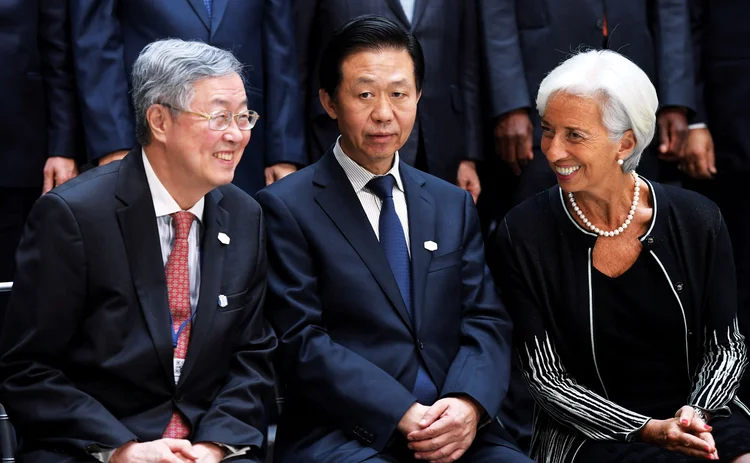
The reforms, as predicted by the PBoC, did lead to speculation of more appreciation with ‘hot money’ flows entering the country, pushing up inflation to a peak of 8.7% in March 2008. The PBoC reacted to this by raising rates during this period, including six times in 2007, and increased its required reserves to 17.5%.
Peg returns – for a while
With the onset of the global financial crisis, however, the PBoC switched back to a de facto dollar peg to support exports and a 4 trillion yuan fiscal stimulus plan, with a balance of payments surplus re-emerging in 2010. But Zhou stuck to his reform plan, saying at a press conference in March 2010 that the peg was “a special measure”, introduced in response to challenges raised by the global financial crisis, which “sooner or later will be withdrawn”.
By the summer of 2010, Zhou fulfilled his promise, with the PBoC switching the renminbi forex rate back to pre-crisis reference currency basket, but there was no one-off appreciation, as occurred in 2005. The currency band was increased to +/–1% in April 2012. “This underlines China’s commitment to rebalance its economy toward domestic consumption and allow market forces to play a greater role in determining the level of exchange rates,” said IMF managing director Lagarde at the time.
Financial reforms
The PBoC also had the formal task of ensuring stability in the financial system as set out under China’s 1995 Central Banking Law, which also ensured three policy banks – the China Development Bank, Export-Import Bank of China and Agricultural Development Bank of China – were set up to finance investment projects of national priority, taking some of this pressure off China’s ‘big four’ state-owned commercial banks. Meanwhile, authority for running the big four commercial banks – China Construction Bank (CCB), Industrial and Commercial Bank of China (ICBC), Agricultural Bank of China (ABC) and Bank of China – was centralised at their headquarter level.
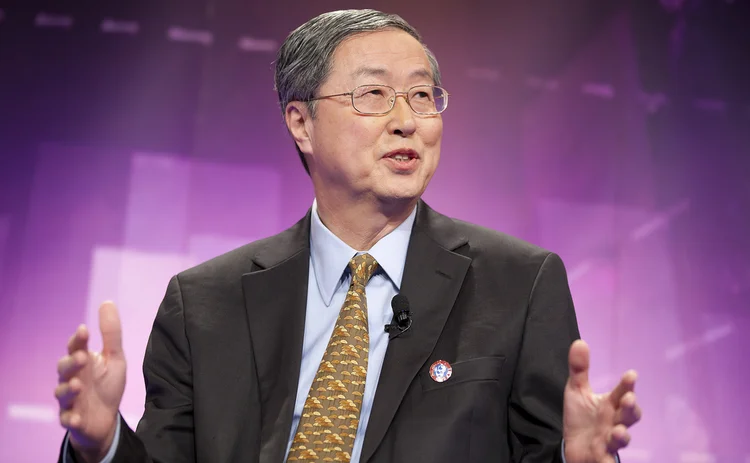
The banking industry, however, remained plagued by non-performing loans following a collapse in property prices in 1993. In 1996, the entire banking sector faced a technical bankruptcy, with NPLs soaring above 25% of total loans, according to some estimates. The Chinese authorities supported a recapitalisation programme whereby the government injected $32.6 billion into the banks through the Ministry of Finance, which issued the same amount of special treasury bonds. This pushed the capital adequacy ratios of banks up to 8% by the end of the 1997. NPLs were carved off into four asset management companies: Xinda (CCB), Changcheng (ABC), Huarong (ICBC) and Dongfang (Bank of China). The four asset management companies issued 1.4 trillion yuan of bonds to purchase 1.4 billion yuan of NPLs from the banks.
Zhou was well informed about the precarious state of the banks, having worked as vice-chairman of Bank of China between 1991 and 1995 and as chairman of CCB from 1998 to 2000.
After he was appointed governor of the PBoC in 2002, the central bank, which hosted the State Council’s Leading Group on Shareholding Reforms of State Banks, helped to pioneer a series of politically viable and technically sound banking reforms. The aim was to set the banks on a sustainable footing by unleashing market-based mechanisms, while improving the effectiveness of monetary policy to improve overall financial and economic stability. “Zhou has a very strategic view about institutions and their role in helping to strengthen China’s ability to implement monetary policy,” says Sheng.
The PBoC secured backing from the country’s leaders to tap its excess reserves to recapitalise the banks, while the government also conducted another NPL disposal involving 1.2 trillion yuan of NPLs, which were transferred to the four asset management companies, but this time via an auction mechanism.
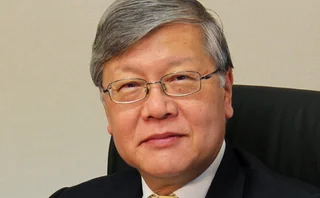
A PBoC-sponsored vehicle, Central Huijin Investment, injected $45 billion from the central bank’s reserves into CCB and Bank of China (the two banks Zhou had worked at) in January 2004. The fifth-biggest Chinese bank, Bank of Communications, also received $365 million from Huijin in 2005. “He understood that forex reserves should be used proactively,” Sheng tells Central Banking.
Ultimately, Huijin – then headed by Xie Ping (considered a Zhou lieutenant) – became the main shareholder in China’s banking system. Huijin expected to make a financial return on bank holdings.
Zhou also supported efforts to take the banks public as a mechanism to force them to improve their poor credit analysis, risk management and corporate governance. Around this time, the PBoC also gained authority to appoint senior management at the big four. Notably, Guo Shuqing, now PBoC party chief and chairman of the newly combined China Banking and Insurance Regulatory Commission (CBIRC), where he appoints the heads of the commercial banks, was asked to chair the board of CCB, where he streamlined the institution, including slashing its number of board directors by 75%, offered performance-related incentives and poaching a Bank of America corporate planner for its board.
Zhou led profound banking reforms since 2002, and pioneered financial liberalisations throughout his governorship, balancing between political demand for rapid growth and the bank’s institutional mandate of price stability
Hui Feng, CB contributory editor, co-author of The rise of the People’s Bank of China
“Zhou led profound banking reforms since 2002, and pioneered financial liberalisations throughout his governorship, balancing between political demand for rapid growth and the bank’s institutional mandate of price stability,” Hui, who is an ARC future fellow at Griffith Asia Institute, tells Central Banking.
Led by Zhou, the PBoC also facilitated reform of China’s capital markets in 2005 by promoting the flotation of state shares. At the same time, the PBoC took control of national brokerages through Huijin and smaller regional brokerages through Construction Investment Co, a unit of Huijin. By the end of 2005, the State Council approved $37.5 billion of capital injections by Huijin into 13 brokerages.
The PBoC also set up a protection fund for stock investors related to mishandling by brokerages, which, in effect, gave the PBoC some supervisory authority in the securities market. And it was an early supporter of foreign capital in China’s A-share market, under the qualified foreign institutional investor quota system. “He was very market-orientated, always thinking of ways to improve the market mechanisms and the infrastructure,” says Sheng.
Bonded to reform
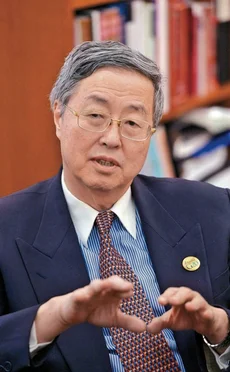
Zhou’s leadership of the PBoC at this time also saw the Chinese central bank support efforts to develop a Chinese corporate bond market and overhaul of China’s payment and settlement system. The PBoC permitted the issuance of commercial paper (bonds of up to a year) in 2005, when it also deployed the fibre-optic-based China National Advanced Payments System, which allowed large and small payments to be handled and cleared electronically. The PBoC also supported the 2002 development of the card-based China UnionPay.
Zhou also introduced medium-term notes – corporate bonds in all but name – of up to five years in 2008, effectively kick-starting the corporate bond market, despite it formally being under the control of the National Development and Reform Commission (NDRC), according to Bell and Hui: “The banking system has been substantially transformed, albeit gradually, from part of the state bureaucracy to one that increasingly embraces ownership diversification, modern modes of corporate governance and risk management, and growing scrutiny by the international market.”
“Zhou is the technocrat with the lead authority in this area,” said Barry Naughton in a 2004 article in China Leadership Monitor.2
“The fact that the programme went ahead in December 2003 demonstrates that [premier] Wen Jiabao has accepted Zhou Xiaochuan’s overall blueprint for financial reforms, and has assembled a workable political consensus around the proposals.”
Setbacks
The PBoC did not always appear to get its way under Zhou.
One example often cited was the creation of the CIC sovereign wealth fund, using foreign reserves previously managed by Safe. Not only that, CIC was merged with Huijin, thereby severing the PBoC’s direct control over the activities of banks and securities companies. While the CIC was managed under the State Council – and the PBoC secured favourable terms for the use of Safe assets – it was staffed with Ministry of Finance and NDRC staff. One China expert, however, says Zhou himself was supportive of the creation of CIC. It is notable that Zhou currently sits on CIC’s international advisory council.
In addition, the PBoC’s prescriptions for the banks were enacted for ICBC and, eventually, ABC. Ultimately, Safe retains oversight of the vast majority of China’s forex reserves. Moreover, despite the setbacks, Zhou was reappointed governor in 2008, the same year that the PBoC extended the term of bills from one year to five years, creating a new medium-term corporate bond market managed by a dealer’s association overseen by the PBoC, demonstrating the PBoC and Zhou still had support from the leadership.
Renminbi as an international currency
Internationally, Zhou had also earned a strong reputation, both with central bank peers and with officials working at multilateral institutions, such as the IMF and Bank for International Settlements. The classical music lover is cited for his cerebral yet engaging and humorous style, his economic vision, consistency of message, and his ability to deliver promised policy results over a sustained period of time.
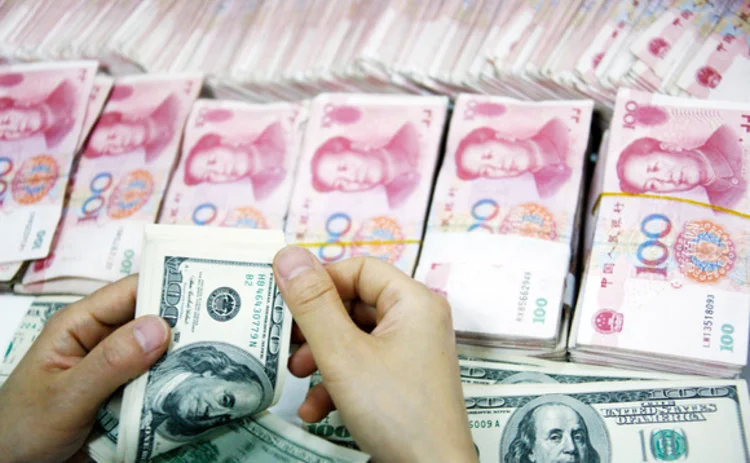
Insiders at the Bank for International Settlements describe Zhou as having regularly attended central bank governor meetings – only missing them when the State Council required his presence elsewhere. His attendance was described as “very active” and “lucid”. It was a similar story regarding his role at IMF and G20 meetings. While Zhou’s international appeal did open him up to criticism at home, it did not undermine him – perhaps because of his enduring efforts to promote China’s national interests.
The combination of these factors meant Zhou played a central role in the internationalisation of the renminbi, through the consistent punching of holes in China’s capital account regime, his ongoing effort to loosen forex exchange controls, as well as his actions to promote the use of the Chinese currency in the aftermath of the global financial crisis – having witnessed how US dollar liquidity seized up in key markets.
After 2008, the PBoC pressed ahead to promote the use of renminbi around the world. It supported the offshore development of renminbi in Hong Kong and elsewhere, and encouraged bilateral settlement in renminbi where this made commercial sense. It also signed a series of currency swap agreements, initially with Asian and developing economy central banks, but culminating in a 350 billion yuan swap line with the European Central Bank and a 200 billion yuan swap facility with the Bank of England in 2013.
The highlight came when renminbi was included in the IMF’s Special Drawing Rights (SDR) in 2016 – despite China’s still imposing many currency controls. It was also made despite concerns among some central bank reserve managers about liquidity in off-the-run Chinese onshore debt as well as their ability to convert Chinese bonds, free of controls, should an extreme crisis flare up. The IMF’s decision to give renminbi a 10.92% SDR quota was in large part due to Zhou-led commitments and China’s implementation of market-based reforms, as well as Zhou’s efforts to create a more robust international monetary system. As IMF chief Lagarde says: “With Zhou’s leadership, China and the International Monetary Fund’s partnership has grown significantly, and our relationship with China has been excellent.”
A third term
Zhou’s third term was unexpected by most.
Speculation grew in 2012 about who would replace him when his name failed to appear among the list of officials on the Chinese Central Committee that year. A Central Banking article reviewing the potential candidates for the governorship, ‘The next “Mr RMB”’, struggled to identify who could seamlessly replace Zhou – at least at that moment in time. The new Chinese leadership under President Xi and Premier Li ultimately reached a similar conclusion, and Zhou was named vice-chairman of the National Committee of the Chinese People’s Political Consultative Conference in 2013. This elevated rank enabled him to work past the mandatory retirement age of 65 for a government minister, and so he started another term as governor.
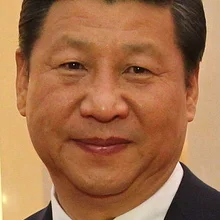
Zhou lost little time in once more pursuing the reform agenda.
The central bank initiated reform of the interest rate regime that set a floor on banks’ lending rates and a ceiling on deposit rates, despite speculation that Zhou may be replaced in 2013. The restrictions, while ensuring bank profitability, had discouraged banks from making risky on-balance-sheet loans, meaning state-owned enterprises tended to secure funding at the expense of private institutions – the sector that creates the most new jobs. Rate reformation was aligned towards helping China move towards a more innovation-based and services growth model versus a mid-level manufactured-export approach. It also represented a chance to reverse a trend towards off-balance-sheet lending, notably via wealth management products, which had grown to such scale that they threatened financial stability.
The PBoC first launched interbank certificates of deposit and then cancelled the lower threshold on lending rates in 2013. In 2015, it removed the market-based ceiling on deposit rates, although there are still controls in the form of formal pricing guidance and restraints through a self-disciplinary mechanism, with deposit rates not permitted to move upwards in excess of 50% of benchmark rates – despite a full liberalisation of deposit rates being essential to improving the PBoC’s ability to transmit policy-decisions. In 2015, the PBoC also spearheaded the introduction of deposit insurance, covering renminbi and non-renminbi deposits for all banks of up to 500,000 yuan per depositor per institution.
Zhou’s efforts to shift China towards a more market-based economy have always been dependent on macroeconomic conditions. Efforts to tighten up credit standards – including local government debt and property-related funding – have waxed and waned, depending on overall macroeconomic conditions. And when China faced problems when cash flooded out of the country in 2016, the PBoC once more had to ratchet up capital controls. Zhou is also said to have failed in his efforts to establish a ‘super-central bank’ by merging the insurance, banking and securities market regulators into the PBoC. Instead, the Financial Stability and Development Committee was established in 2017 under the State Council, with the aim of helping improve the effectiveness of regulation, and addressing regulatory challenges brought by increasingly mixed financial services under a previously fragmented and segmented system. There are concerns the FSDC may be prone to more bargaining and inefficiency, due to the involvement of the main regulators, the central bank, the NDRC and other bodies.
Nonetheless, the PBoC’s role has been strengthened overall in the new regulatory regime, with the administrative office of the FSDC nested under the PBoC, and the reform-minded Yi Gang taking over as governor of the PBoC and Guo Shuqing as party chief and deputy governor of the PBoC and head of the CBIRC – the combined banking and insurance regulator. This month, the PBoC was given responsibility for macro-prudential policy.
“Zhou has been a revolutionary figure for the Chinese central bank. He largely turned the bank from a bureaucracy into a technocracy,” Hui tells Central Banking. “He has a rare combination of both policy expertise and political clout, being able to take decisive actions, but also knows when to strike comprises to get things done.”
Looking forward
In his last press conference as PBoC governor, on March 9, 2018, Zhou said the rapid growth in Chinese debt – something he had fretted could cause ‘a Minsky moment’ – had stabilised, citing that broad money growth was now below nominal GDP growth. He also said that China’s growth model had evolved from a quantity-driven to quality-driven approach, with a falling reliance on credit (although another round of infrastructure investment is being readied in the event of a major trade war with the US). He added that China was ready for bolder measures, such as accelerating market access measures to improve the connectivity between Chinese capital markets and other major global centres.
In his last press conference as PBoC governor, Zhou said China was ready for bolder measures, such as accelerating market access measures to improve the connectivity between Chinese capital markets and other major global centres
Zhou stressed that some of China’s trade liberalisation had been limited by the 2008 global crisis, but the country was in a ‘new stage’ and could implement fresh reforms. He added that in his “personal experience” there were “some gaps in financial supervision”, as well as some financial rules that needed strengthening and some risky financial institutions that needed to be “dealt with promptly”.
The future of renminbi internationalisation, he said, depended on market participants and their willingness to use the Chinese currency in terms of investment, settlement and asset valuation, suggesting it would probably be “a gradual process”. At a later event in August after retirement, Zhou said renminbi internationalisation was “not a linear process”, but would move “sometimes faster and sometimes slower”. But he believed that, in the long run, “given China’s status in the international community, the future of renminbi internationalisation is promising”.
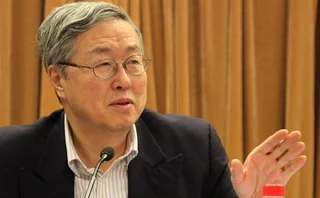
Zhou achieved so much because of a compelling combination of qualities. Sheng is not alone in this description of Zhou: “A person of great talent, charm and charisma, always sportsmanlike and graceful in dealing with all situations, including with his characteristic disarming smile. Truly one of the leading reformers in both the trade and financial history of China since the 1980s.”
In retirement, Zhou continues to play an important role in China’s development. He is president of the China Society for Finance and Banking, vice-chairman of the Boao Forum for Asia (and China’s chief representative), chairman of the International Finance Forum and a professor and tutor of doctorate candidates at the Tsinghua University School of Economics and Management and PBC School of Finance. Zhou is a member of the CIC international advisory council at a time when Chinese outbound investments are facing growing scrutiny from foreign governments, especially the US.
As governor of the PBoC, Zhou did not see his market-based vision fully realised, but he may yet continue to influence Chinese and global monetary reform. Critically, he has created the institutional capacity at the PBoC for his successors to do so.
Notes
1. Bell, Stephen and Hui Feng, The rise of the People’s Bank of China: the politics of institutional change (Cambridge, Massachusetts: Harvard University Press, 2013).
2. Naughton, Barry, ‘Financial reconstruction: methodical policymaking moves into the spotlight’ in China Leadership Monitor, Issue 10, April 30, 2004.
The Central Banking Awards were written by Christopher Jeffery, Daniel Hinge, Dan Hardie, Rachael King, Victor Mendez-Barreira, Joel Clark, William Towning and Tristan Carlyle
Only users who have a paid subscription or are part of a corporate subscription are able to print or copy content.
To access these options, along with all other subscription benefits, please contact info@centralbanking.com or view our subscription options here: http://subscriptions.centralbanking.com/subscribe
You are currently unable to print this content. Please contact info@centralbanking.com to find out more.
You are currently unable to copy this content. Please contact info@centralbanking.com to find out more.
Copyright Infopro Digital Limited. All rights reserved.
As outlined in our terms and conditions, https://www.infopro-digital.com/terms-and-conditions/subscriptions/ (point 2.4), printing is limited to a single copy.
If you would like to purchase additional rights please email info@centralbanking.com
Copyright Infopro Digital Limited. All rights reserved.
You may share this content using our article tools. As outlined in our terms and conditions, https://www.infopro-digital.com/terms-and-conditions/subscriptions/ (clause 2.4), an Authorised User may only make one copy of the materials for their own personal use. You must also comply with the restrictions in clause 2.5.
If you would like to purchase additional rights please email info@centralbanking.com
